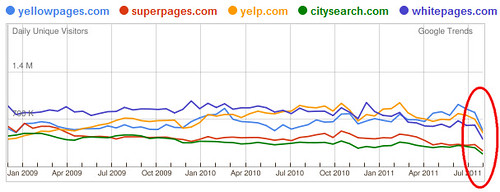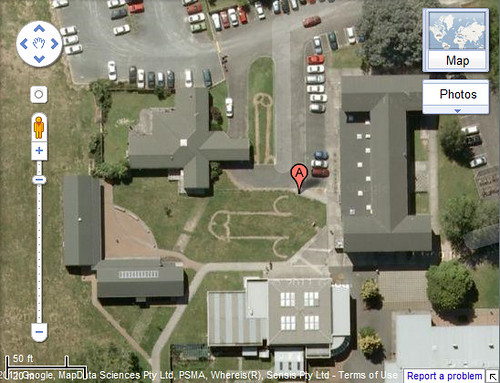The photo released by the White House depicting President Barack Obama and Vice President Joe Biden along with members of the national security team during a briefing on the mission to capture or kill terrorist Osama Bin Laden is rapidly rocketing up to becoming the most-viewed photo on Flickr of all time:

The photo is fascinating for capturing what must’ve been breathless moments when the President, the military and our covert operations organizations wondered if the long search for Osama would at last prove successful.
But, what immediately caught my eye were the documents cast casually before Clinton in the photo — what were they of, and could they be revealing more than the government intended in a picture released to the public? At a glance, I expected they were satellite and/or aerial photos of the compound that Osama had built for himself to hide in. The caption paragraph of the photo page on Flickr apparently even refers directly to it, saying, “Please note: a classified document seen in this photograph has been obscured.” That really draws attention to it! It must be something interesting/cool, if it must be hidden!
I clicked on the magnifying-glass button in Flickr, to view that section of the photo with larger resolution. When viewing the original size, you can see that, indeed, the top document has been pixelated out:

As a side note, isn’t it interesting that there are special White House coffee cups, apparently, with the presidential seal on them? Apparently they don’t do Starbucks at the White House.
I still wonder, though, did they obscure it enough? It’s not unusual for the government to redact sensitive words or other information out of documents, but in this high-tech world it’s moderately risky to allow out photos, even when you try to blur out sensitive information. As I’ve proved before, blurring and pixelation can sometimes be reversed. The type of blurring or bitmapping done to the White House Situation Room photo is pretty lossy — the person who did it would no doubt believe it could not be reversed, since so much information from that area of the photo has been discarded in the process.
Yet, in that part of the picture alone, one could apply image algorithms which would attempt to reverse out the blurring by trying to enhance the elements of the picture that are left. This requires a form of interpolation to rebuild/replace the many pixels in between the blocks of color which resulted from an averaging of the original pixels. For each large block of continuous color, there were originally many pixels in their place which got combined/averaged into a median color. From the lighting in the photo, the color of each pixel, and the context of colors around each, an algorithm could attempt to interpolate and rebuild the picture. Interpolation is a form of mathematical guesswork, so there’s a high degree of inaccuracy involved — even so, the results can be surprising at times.
There are even more advanced algorithms which can reduce noise out of images (such as for medical imaging) or which can build out missing parts of photographic images based upon photographic commonalities. Read the rest of this entry »











Locksmith Spam Listing Issue
May 23rd, 2011 by Chris Silver SmithI recently wrote a piece about how to bite back at local scam businesses over at Natural Search Blog, but one of the more difficult variety of scams are the faux local business listings that Google Places fights. And, ever since people first began scamming listing rankings in print yellow pages, the worst sector affected is that of Locksmiths.
Quite a number of locksmith listings are for business locations which do not exist or do not have locksmiths’ offices there. Some listings are blatent — they are locations where there are no businesses at all — while others are more subtle, being shopping centers or office buildings which have no locksmith shops in them.
Why do the scammers do this? Well, they figured out that in order to have placement in local search results, Read the rest of this entry »
Tags: business listings, local search optimization, locksmiths, online scams, scams
Posted in General Commentary, Law and Legal Matters, local search, Local SEO | 8 Comments »